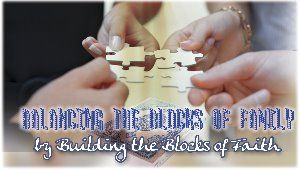… by Building the Blocks of Faith
It’s the day after Eid Ul-Adha and my three children are gathered in the center of the playroom with their Eid gifts scattered around them. After a busy day spent with friends and family, they seem to be enjoying the settled calm of the second day of Eid. Peering quietly over their shoulders, I’m surprised to find that the game holding their attention is not one of the fancy electronic objects that the grandparents believed would captivate them. Instead, the three of them are focused intently on a set of wooden blocks, trying hard to balance a precariously teetering tower.
Watching the look of intense concentration on my children’s faces, it dawns on me that their simple block building is really a microcosmic view of what we, as parents, grandparents, siblings, cousins, sons, daughters, nieces, and nephews do on a daily basis. That wobbly balancing act of managing our kinship roles and giving the best of each of us to our families can sometimes feel like a cautious exercise that we just barely manage to keep from crumbling. Yet, we keep striving towards that balance because we know that the Noble Prophet (SAS) advised us that “The best of you is the best to his family.” (Tirmidhi, Ibn Maajah)
Regardless of the stage of life we are currently in, we all work consistently at balancing the multitude of blocks in our lives. No one can deny that we live in a time where being “busy” is the catch phrase of the century. Whether speaking to a stay-at-home mother of two, a corporate working father, a third year college student, a newly married couple, or even a retired grandparent, we often hear “I’d love to do XYZ or to help with ABC, but I’m soooooo busy.” Although one person’s purported busyness may be seen as another’s leisure, the reality is that what we deem as important in our lives often shifts the blocks of balance and winds up severely cutting into the time that should be spent on family and faith building.
Balancing Our Perceived Burdens
When the hectic nature of life tends to overwhelm us, an important point to remember is beautifully expressed in this ayah of Surat Al-Baqarah: “On no soul doth Allah place a burden greater than it can bear. It gets every good that it earns, and it suffers every ill that it earns. (Pray 🙂 “Our Lord! Condemn us not if we forget or fall into error; our Lord! Lay not on us a burden like that which Thou didst lay on those before us; Our Lord! Lay not on us a burden greater than we have strength to bear. Blot out our sins, and grant us forgiveness. Have mercy on us. Thou art our Protector; Help us against those who stand against faith.” (2:286)
The beauty of this prayer is often forgotten as we struggle in our era of “busyness” to balance what we perceive as priorities. While every person carries specific burdens and defines his or her burden differently, in the end, it is important to remember that Allah (swt) will never weigh us down with something we cannot handle. However, we must remain strong in our iman and in our conscious belief that Allah (swt) is The All-Merciful and will always provides us with what is best. Perhaps the truth of this ayah is most evident when we think we’ve been stretched to the limit and then find that there is more we can handle by the grace of Allah (swt).
A simple comparison of the era of the Prophet (SAS) to our current lives of ease and technology makes it abundantly evident that what we complain about as “having no time” to spend with family or on matters of faith is really just a case of a misappropriation of time. The hours of the day have not been shortened in the years that have passed, but the barakah in the way we use that time has greatly decreased. Unfortunately, in attempting to fulfill our work, leisure, and family roles and our desires to self-gratify and self-entertain, the major sacrifice that is often made is in the deduction of time given to our children, our parents, our siblings, our communities and most of all to our deen.
Balancing Our Blocks of Time
As the Eid takbeerat rang out melodically in the crowded prayer space on the day of Eid Ul-Adha, I looked around at the family and friends gathered together. This was a day that we would celebrate by visiting with the many community members, obscure relatives, and distant kin that usually materialized twice a year to join in the Eid congregations. As my cleanly scrubbed and newly-attired children played happily with distant cousins, I thought about how we had set aside this time—this mere 24 hours—to do nothing but to praise and remember the blessings of Allah (swt) and to try to bring joy to our children, our parents, and our family members. Sadly, though, on every other day of the year, finding 24 minutes of quality time to spend with the family in praise and worship seems like a struggle.
Breaking into my thoughts, the khateeb spoke eloquently about the story of “The Most Successful Parent in History”—Prophet Ibrahim (AS) and his many prayers for righteous children rather than for wealthy, healthy, or successful children because all these blessings would follow if the basis of iman and righteous action existed.
The Prophet Ibrahim prayed “O my Lord, make this city one of peace and security and preserve me and my children from idol worship.” (14:35) The khateeb pointed out that what we must pray for today is an avoidance of idle worship for our children. The wasting of time in our technology-infested world on the Internet, on our smart-phones, and on watching TV is an ever growing plague that threatens the bonds of family as our lives are consumed with idleness and laziness masked as productivity and busyness.
There are an abundance of ahadeeth that remind us of the importance of not wasting the precious gifts of time, faith, and family such as the hadith narrated by Abdullah Bin Mas`ud where Allah’s Messenger (SAS) said: “A man shall be asked concerning five things on the day of resurrection: concerning his life, how he spent it; concerning his youth, how he grew old; concerning his wealth, whence he acquired it, and in what way he spent it; and what was it that he did with the knowledge that he had.” Likewise, the hadith narrated by Mu’adz ibn Jabal (RA) reported that Rasulullah (SAS) said: “Those who are admitted into paradise will not regret over anything of this world, except the time spent without Zikr in their life.”
Although we may be familiar with these Prophetic sayings, we can often get wrapped up in worldly distractions and forget to apply them. As the khateeb pointed out, we may express more anger about a child neglecting a homework assignment or a spouse forgetting to record a favorite TV show than if we neglect or forget a salah. This decline of priorities creates a metaphoric and a literal block of faith that can only interfere in our building of strong families.
Balancing Our Family Roles
Following the Eid prayer and khutbah, snippets of conversation floated around the prayer area as salams and felicitations were exchanged. One of the most interesting strands of conversation that seemed to recur as an oft-repeated lament was “Are you going to your in-laws or to your family first?” Depending on the answer, the response was either a barely stifled groan or a practically exuberant whoop.
As familiar as we may be with the seven ayahs in the Qur’an that stress the importance of being kind and good to our parents, the remembrance of these ayahs is often lost in the marital distinction of my parents versus his parents.
“And we have enjoined on man the doing of good to his parents; with trouble did his mother bear him and with trouble did she bring him forth; and the bearing of him and the weaning of him was thirty months; until when he attains his maturity and reaches forty years, he says: My Lord! grant me that I may give thanks for thy favor which thou hast bestowed on me and on my parents, and that I may do good which pleases thee and do good to me in respect of my offspring; surely I turn to thee, and surely I am of those who submit.” (46:15)
Another familiar verse states “And your Lord has commanded that you shall not serve (any) but him, and goodness to your parents. If either or both of them reach old age with you, say not to them (so much as) “ugh” nor chide them, and speak to them a generous word.” (17:23)
The application of these ayahs extends to both sides of the equation. After all, the union of a couple is much greater than just two individuals joining together; it is the joining of two families and two lives. Allah (swt) describes this important relationship as “They are your garments, and you are their garments.” (2:187)
Imagine the vulnerability one would experience facing the world alone and unclothed. One can then understand and appreciate the importance and the interdependence of the husband and wife relationship. The importance of balancing the roles of husband and wife can also be seen in the ayah that states: “And among His Signs is this that He created for you mates from among yourselves, that ye may dwell in tranquility with them, and He has put love and mercy between your (hearts): verily in that are Signs for those who reflect.” (30: 21)
Just from these ayahs alone one can grasp the importance of fulfilling and respecting the roles of mother and father (both natural and in-laws), husband and wife, daughter and son, and the magnitude of maintaining bonds of kin. Thus, the true foundation of family lies in our adherence to faith. Without building these bonds and restructuring our use of time through a strengthened iman, the ultimate demise of the family could be inevitable.
Building and Balancing
As I continue to watch the children building their block tower, I know that the teetering structure can only bear so much height until the forces of gravity will likely pull it downwards. Just as I predicted, the wooden blocks tumble down with a resounding clatter. Rather than expressing anger or frustration at the scattered pieces, the children simply laugh and begin the process of building again.
There’s a lesson here for all of us who struggle to “find the time” to be with our families on a daily basis. The blocks are bound to fall eventually when you stack them too high and on a narrow base. By building our faith first and integrating that faith into our family life, we will create a much stronger foundation upon which to continue the upwards stacking.
Begin with yourself, your iman, and your own concept of time and then move outwardly to influence your family, your friends, and your community. The resulting ripple that will emanate is bound to help support other towers from crumbling as well. And even if a few blocks do fall, don’t be afraid to pick them back up and start building again.
Drawn in by my children’s laughter, I glance over at the soup boiling on the stove, the open textbook on the counter, the phone chiming an email notification, and the laptop screen blinking with a half-written chapter. Leaving the chaos of the kitchen, I consciously sit down to help them build another block tower. After all, an added 24 minutes spent with my children seems to be a much more productive use of time.
By Suzy Ismail






